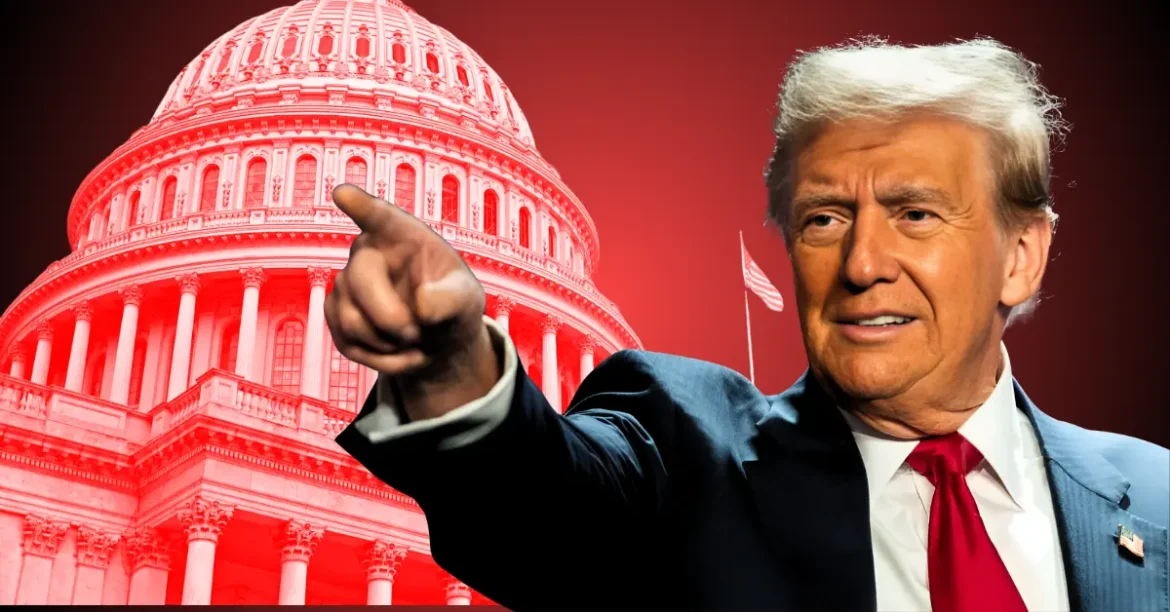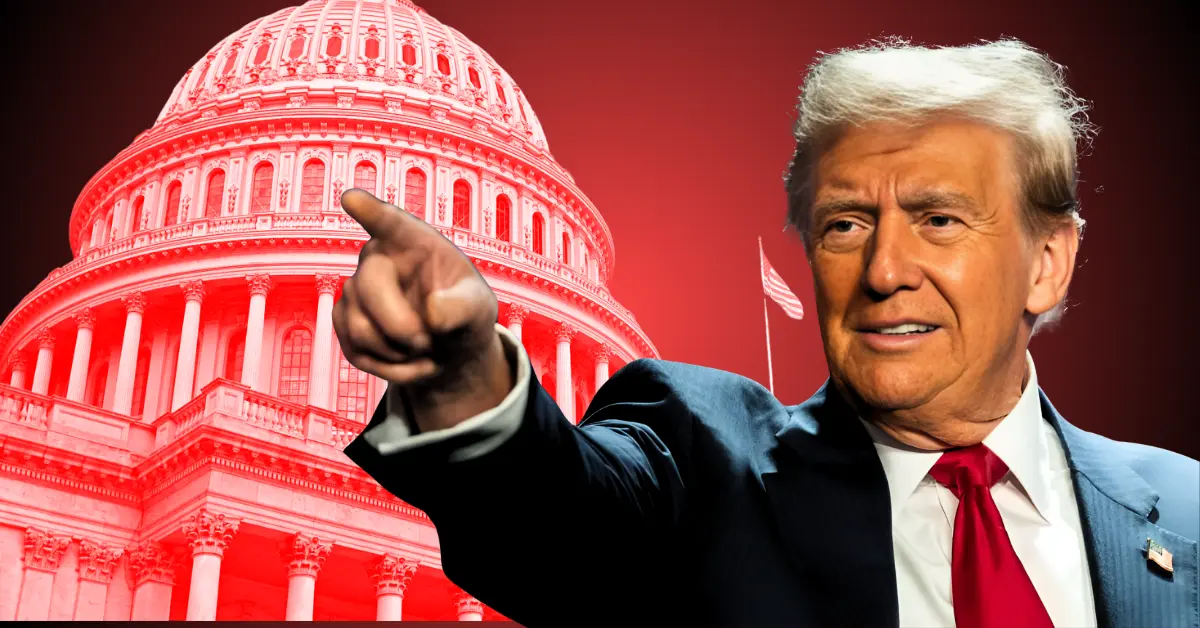The “One Big Beautiful Bill Act” of 2025 has ignited a political firestorm in the United States, reflecting the deep ideological divides that characterize contemporary American politics. The bill’s passage in the Senate, though narrow, marks a significant victory for President Donald Trump and his administration. However, the intense partisan battles surrounding its enactment and the looming challenges in the House of Representatives underscore the contentious nature of the legislation.
The “One Big Beautiful Bill Act” is a sweeping piece of legislation that encompasses a wide range of policy areas, from tax cuts to spending increases and healthcare reforms. The bill’s primary provisions include the extension of existing tax cuts, primarily benefiting corporations and high-income earners, and substantial investments in border security, defense, and energy production. These provisions are designed to solidify President Trump’s second-term agenda and address key campaign promises. However, the bill also proposes cuts to healthcare and nutrition programs, which have sparked significant controversy and opposition.
The Senate vote on the “One Big Beautiful Bill Act” was a dramatic affair, characterized by intense negotiations, partisan tactics, and a tie-breaking vote by Vice President JD Vance. Democrats employed various delaying tactics, including demanding that the 940-page bill be read aloud in its entirety, to stall the vote. Senator Chuck Schumer, the Minority Leader, criticized Republicans for supporting the bill out of fear of President Trump, referencing Senator Murkowski’s earlier comments about GOP lawmakers being afraid to cross the president. Despite holding a majority in the Senate, Republicans faced internal dissent, with Senator Lisa Murkowski initially opposing the bill before ultimately flipping her vote. This underscores the complex political dynamics within the Republican party and the challenges of uniting different factions behind a single piece of legislation.
The passage of the “One Big Beautiful Bill Act” has elicited strong reactions from across the political spectrum. The Trump administration hailed the bill’s passage as a “resounding victory” for American workers, farmers, and small businesses, emphasizing the potential for economic growth and job creation. Democrats, however, condemned the bill as a giveaway to the wealthy and a threat to essential social programs. They vowed to continue fighting against its enactment in the House. Economists and analysts have offered mixed assessments of the bill’s potential impact, with supporters arguing that the tax cuts will stimulate economic activity and investment, while critics warn that they will exacerbate income inequality and increase the national debt. Investors reacted to the Senate’s passage of the bill with cautious optimism, with some sectors, such as energy and defense, expected to benefit from the increased spending.
Following its passage in the Senate, the “One Big Beautiful Bill Act” now faces a crucial test in the House of Representatives. Speaker Mike Johnson faces the challenge of uniting his party behind the bill, as divisions exist within the House Republican caucus. The House may propose amendments to the bill, which would require further negotiations with the Senate. The Trump administration has expressed a desire to have the bill passed by July 4th, adding pressure on lawmakers to act quickly. Adding a layer of complexity to the political landscape, a public feud erupted between President Trump and tech mogul Elon Musk. This dispute reportedly stemmed from Trump’s concerns about Musk’s subsidies and Musk’s criticism of the “One Big Beautiful Bill Act.” The feud underscores the growing tensions between the tech industry and the Trump administration and could potentially influence the bill’s prospects in the House.
The “One Big Beautiful Bill Act” represents a pivotal moment in American politics. Its narrow passage in the Senate highlights the deep divisions within the country and the challenges of governing in a polarized environment. Whether the bill will ultimately become law remains to be seen, as it faces significant hurdles in the House of Representatives. Regardless of its fate, the “One Big Beautiful Bill Act” will undoubtedly have a lasting impact on the American economy, social programs, and political landscape. The coming weeks promise to be a critical period as the House debates the bill and the nation grapples with its potential consequences. The bill’s passage in the Senate, though narrow, marks a significant victory for President Donald Trump and his administration. However, the intense partisan battles surrounding its enactment and the looming challenges in the House of Representatives underscore the contentious nature of the legislation. The “One Big Beautiful Bill Act” is a sweeping piece of legislation that encompasses a wide range of policy areas, from tax cuts to spending increases and healthcare reforms. The bill’s primary provisions include the extension of existing tax cuts, primarily benefiting corporations and high-income earners, and substantial investments in border security, defense, and energy production. These provisions are designed to solidify President Trump’s second-term agenda and address key campaign promises. However, the bill also proposes cuts to healthcare and nutrition programs, which have sparked significant controversy and opposition. The Senate vote on the “One Big Beautiful Bill Act” was a dramatic affair, characterized by intense negotiations, partisan tactics, and a tie-breaking vote by Vice President JD Vance. Democrats employed various delaying tactics, including demanding that the 940-page bill be read aloud in its entirety, to stall the vote. Senator Chuck Schumer, the Minority Leader, criticized Republicans for supporting the bill out of fear of President Trump, referencing Senator Murkowski’s earlier comments about GOP lawmakers being afraid to cross the president. Despite holding a majority in the Senate, Republicans faced internal dissent, with Senator Lisa Murkowski initially opposing the bill before ultimately flipping her vote. This underscores the extreme political dynamics within the Republican party and the challenges of uniting different factions behind a single piece of legislation. The passage of the “One Big Beautiful Bill Act” has elicited strong reactions from across the political spectrum. The Trump administration hailed the bill’s passage as a “resounding victory” for American workers, farmers, and small businesses, emphasizing the potential for economic growth and job creation. Democrats, however, condemned the bill as a giveaway to the wealthy and a threat to essential social programs. They vowed to continue fighting against its enactment in the House. Economists and analysts have offered mixed assessments of the bill’s potential impact, with supporters arguing that the tax cuts will stimulate economic activity and investment, while critics warn that they will exacerbate income inequality and increase the national debt. Investors reacted to the Senate’s passage of the bill with cautious optimism, with some sectors, such as energy and defense, expected to benefit from the increased spending. Following its passage in the Senate, the “One Big Beautiful Bill Act” now faces a crucial test in the House of Representatives. Speaker Mike Johnson faces the challenge of uniting his party behind the bill, as divisions exist within the House Republican caucus. The House may propose amendments to the bill, which would require further negotiations with the Senate. The Trump administration has expressed a desire to have the bill passed by July 4th, adding pressure on lawmakers to act quickly. Adding a layer of complexity to the political landscape, a public feud erupted between President Trump and tech mogul Elon Musk. This dispute reportedly stemmed from Trump’s concerns about Musk’s subsidies and Musk’s criticism of the “One Big Beautiful Bill Act.” The feud underscores the growing tensions between the tech industry and the Trump administration and could potentially influence the bill’s prospects in the House. The “One Big Beautiful Bill Act” represents a pivotal moment in American politics. Its narrow passage in the Senate highlights the deep divisions within the country and the challenges of governing in a polarized environment. Whether the bill will ultimately become law remains to be seen, as it faces significant hurdles in the House of Representatives. Regardless of its fate, the “One Big Beautiful Bill Act” will undoubtedly have a lasting impact on the American economy, social programs, and political landscape. The coming weeks promise to be a critical period as the House debates the bill and the nation grapples with its potential consequences.





